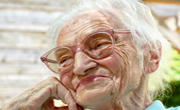Bragg Street Park
This project transformed what was basically a desolate piece of land into a beautiful neighborhood park. The project included extensive landscaping, installation of a playground, and a sitting area. Budget: $39,000. April 2002. NC46.
All the help we can get
June 17, 2002
By RUTH SHEEHAN, Staff Writer
Today, the community unveils a tiny park with an enormous heart.
After months of elbow grease and door-to-door dollar-collecting, a group of generous do-gooders is ready to show off the new Bragg Street Mini Park. Formerly one of the most forlorn, drug-addled corners of Raleigh, it is now a cheerful, well-equipped gathering place for everyone from toddlers to adults.
Getting the park renovated and retooled has been a journey.
It has brought together all sorts of local, and not-so-local, interests, from the park’s immediate neighbors to the organizations near and far that have contributed time and money.
Even the City of Raleigh has chipped in manpower and expertise. Not to mention the tent and podium lent by the city for today’s made-for-TV grand re-opening. The mayor and others are scheduled to speak.
Still, for all the hard work and collaboration, the Bragg Street project remains $10,000 shy of its $26,000 price tag, not counting in-kind contributions.
What troubles me is that the city of Raleigh’s cash contribution to the cause totals $0.
Not that the organizers and renovators are complaining. They express their gratitude to the city at every opportunity.
Donna Kidder, who is part of the Morrisville-based that headed up the project, practically gushed when she described how the city generously gave its permission for the renovations to occur. Generous indeed, until you remember that Bragg Street Mini Park happens to be part of the city’s own park system, not some vacant and abandoned lot.
Folks who live near the minipark tell me they have been begging the city for improvements there for as long as they can remember. “The neighbors have been asking for attention to that park for years,” said Bruce Lightner, who lives three blocks away. But the minipark, located on the city’s most infamous street, was not a priority.
It’s not that the park was left a dump. The city always kept it passably clean. But there on the end of Bragg Street, the so-called drug element was spending far more time than the children the park was created for. There was a lot more doping than jump-roping. A lot more hanging out than hanging on the monkey bars.
At the Raleigh City Council’s June 4 meeting, volunteers reported on the extraordinary volunteer effort transforming the park and asked the city for whatever financial help it could provide.
Wayne Schindler, Raleigh superintendent of parks, is also expected to ask the city to pay for a high fence at the back side of the park so that drug dealers will no longer have an easy way to elude police.
Kidder hopes the city will come through with at least some small sum.
Even in these tight budget times, that only seems right. Purely as a symbolic gesture, if nothing else. We’ve heard a lot of big political talk in recent years about the importance of Southeast Raleigh.
Here’s a chance for the city to put some pennies where its podium is.
If you want to help, send checks payable to Passage Home (write Bragg Street Mini Park on memo line), P.O. Box 17588, Raleigh, N.C. 27619.
Reprinted with Permission of The News & Observer of Raleigh, North Carolina.
Volunteers reclaim park
Bragg Street neighbors say it has been a haven for crime
Sunday, May 26, 2002
By MOLLY HENNESSY-FISKE, Staff Writer
RALEIGH – A quiet revolution was under way at Bragg Street Mini-Park Saturday. In the shade of two towering pecan trees, children from one of the poorest corners of Southeast Raleigh joined volunteers refurbishing basketball courts, swing sets and picnic tables.
Like the surrounding neighborhood, the little park at the corner of Bragg and South Person streets had fallen on hard times. Neighbors said adults populated park benches and stayed late into the night, shouting and cursing. Drug dealers fleeing police used it as an escape route, running past the swing sets to hop a rear fence and hide in adjacent yards. Those who called police, including longtime neighbor Cuetonus Moore, were told park users could stay until 11 p.m.
“My bedroom is right there and I couldn’t do anything,” said Moore, 32, of 1112 S. Person St. She brought her 4-year-old son Amis next door to explore park improvements Saturday morning.
Jenise R. Jeffries, 11, stood nearby, writing name tags for volunteers. She also lives on Person Street and relied on the park for pick-up basketball, kickball and dodge ball games. She felt safe there. Crossing the street was the problem.
Organizers of the clean-up say the area around Bragg Street has perhaps the highest concentration of vacant homes in Wake County. Jeffries does not notice the empty houses so much as the activity outside of them. One day she said she looked outside and saw a green car drive by, spewing bullets. She ran outside.
“Children were actually outside playing. I saw bullets lying by my Dad’s truck,” she said, “I’m just trying to hang in because my friends are here.”
The government has stepped in to fix some of the underlying problems near the park. The Weed and Seed program, a federal and local partnership, is paying for renovations to some vacant houses. Capital area police added patrols, and now enforce a dawn-to-dusk schedule, Moore said. Passage Home, a housing and family development agency, pitched in. Fulfilled Promise Tabernacle Church on Bledsoe Street and Weed and Seed both arranged for volunteers to help at the park Saturday.
But most of the organizing and fund-raising for the $25,000 renovation job was done by volunteers from WorldLegacy, a Morrisville-based company that runs adult leadership courses. About a dozen participants showed up Saturday for their second weekend of work, laying bricks and shoveling sand. Among them was Donna Kidder, 48, who had first suggested the park as an opportunity for classmates to test their leadership skills.
Although she lives in North Raleigh, Kidder is tied to the area: Her daughter began serving a 26-month sentence last fall at the N.C. Correctional Institution for Women at the end of Bragg Street. Just about every week she comes to visit.
At first she kept the windows rolled up and a bottle of mace within reach. Then, as the park project evolved this spring, she started walking around. On Saturday, she showed up after visiting hours wearing shorts, a tank top and baseball hat, milling happily with the crowd of volunteers and children.
Money for construction materials came from personal donations and area businesses, she said. Private donors were given gladiola bulbs in return for their investment — Kidder alone has already given away about 150. They must raise $14,000 more before the park is paid for.
Organizers plan to ask City Council members at their June 17 meeting for extra money to offset the cost of the plastic and metal jungle gym equipment. And other improvements could still be made: a fence between the basketball courts and picnic area, for instance, and a higher rear fence to deter fleeing felons.
“It’s been a rough area for a little while,” said Moore, who has lived in the house she owns for about 10 years, “Hopefully, we can work together and it will get better.”
Reprinted with Permission of The News & Observer of Raleigh, North Carolina.







